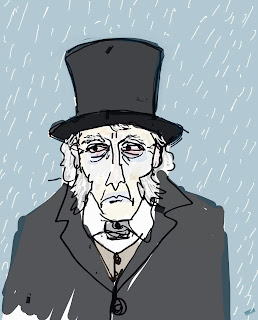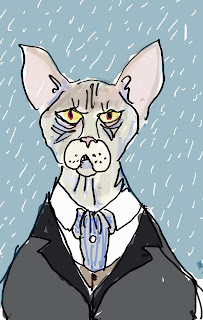A Christmas Carol? Cats? Bah! Humbug!
I bet you've seen 10 different productions of A Christmas Carol, but never read it. Well, this is your opportunity. ScribbleFire.com will publish the Dickens classic in serial form from November 7 to December 22. The whole novella will come to you in 34 installments (Monday though Friday) of approximately 800 words, featuring my illustrations (of all your favorite characters as cats). What better way to experience this beautifully written story?
I have published the first episode here. All subsequent episodes will appear at https://scribblefire.com/news/.
Enjoy...
I have published the first episode here. All subsequent episodes will appear at https://scribblefire.com/news/.
Enjoy...
A CHRISTMAS CAROL
A Ghost Story of Christmas
By Charles Dickens
STAVE 1:
MARLEY’S GHOST.
MARLEY was dead: to begin with. There
is no doubt whatever about that. The register of his burial was signed by the
clergyman, the clerk, the undertaker, and the chief mourner. Scrooge signed it:
and Scrooge’s name was good upon ’Change, for anything he chose to put his hand
to. Old Marley was as dead as a door-nail.
 |
| Scrooge: "...eyes red, his thin lips blue..." |
Scrooge knew he was dead? Of course he
did. How could it be otherwise? Scrooge and he were partners for I don’t know
how many years. Scrooge was his sole executor, his sole administrator, his sole
assign, his sole residuary[sic] legatee, his sole friend, and sole mourner. And even
Scrooge was not so dreadfully cut up by the sad event, but that he was an
excellent man of business on the very day of the funeral, and solemnized it
with an undoubted bargain.
The mention of Marley’s funeral brings
me back to the point I started from. There is no doubt that Marley was dead.
This must be distinctly understood, or nothing wonderful can come of the story
I am going to relate. If we were not perfectly convinced that Hamlet’s Father
died before the play began, there would be nothing more remarkable in his
taking a stroll at night, in an easterly wind, upon his own ramparts, than
there would be in any other middle-aged gentleman rashly turning out after dark
in a breezy spot—say Saint Paul’s Churchyard for instance—literally to astonish
his son’s weak mind.
Scrooge never painted out Old Marley’s
name. There it stood, years afterwards, above the warehouse door: Scrooge and
Marley. The firm was known as Scrooge and Marley. Sometimes people new to the
business called Scrooge Scrooge, and sometimes Marley, but he answered to both
names. It was all the same to him.
Oh! But he was a tightfisted hand at
the grindstone, Scrooge! a squeezing, wrenching, grasping, scraping, clutching,
covetous, old sinner! Hard and sharp as flint, from which no steel had ever
struck out generous fire; secret, and self-contained, and solitary as an
oyster. The cold within him froze his old features, nipped his pointed nose,
shriveled his cheek, stiffened his gait; made his eyes red, his thin lips
blue; and spoke out shrewdly in his grating voice. A frosty rime was on his
head, and on his eyebrows, and his wiry chin. He carried his own low
temperature always about with him; he iced his office in the dog-days; and
didn’t thaw it one degree at Christmas.
External heat and cold had little
influence on Scrooge. No warmth could warm, no wintry weather chill him. No
wind that blew was bitterer than he, no falling snow was more intent upon its
purpose, no pelting rain less open to entreaty. Foul weather didn’t know where
to have him. The heaviest rain, and snow, and hail, and sleet, could boast of
the advantage over him in only one respect. They often “came down” handsomely,
and Scrooge never did.
Nobody ever stopped him in the street
to say, with gladsome looks, “My dear Scrooge, how are you? When will you come
to see me?” No beggars implored him to bestow a trifle, no children asked him
what it was o’clock, no man or woman ever once in all his life inquired the way
to such and such a place, of Scrooge. Even the blind men’s dogs appeared to
know him; and when they saw him coming on, would tug their owners into doorways
and up courts; and then would wag their tails as though they said, “No eye at
all is better than an evil eye, dark master!”
But what did Scrooge care! It was the
very thing he liked. To edge his way along the crowded paths of life, warning
all human sympathy to keep its distance, was what the knowing ones call “nuts”
to Scrooge.
#CharlesDickens #Dickens #ChristmasCarol #ghost #Scrooge #Bah #Humbug
***
Follow all 34 episodes at www.ScribbleFire.com/news#CharlesDickens #Dickens #ChristmasCarol #ghost #Scrooge #Bah #Humbug




Comments
Post a Comment